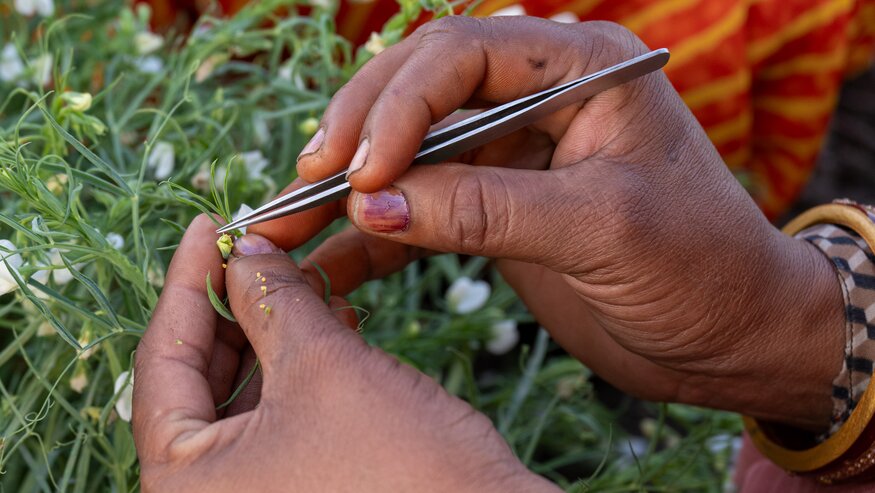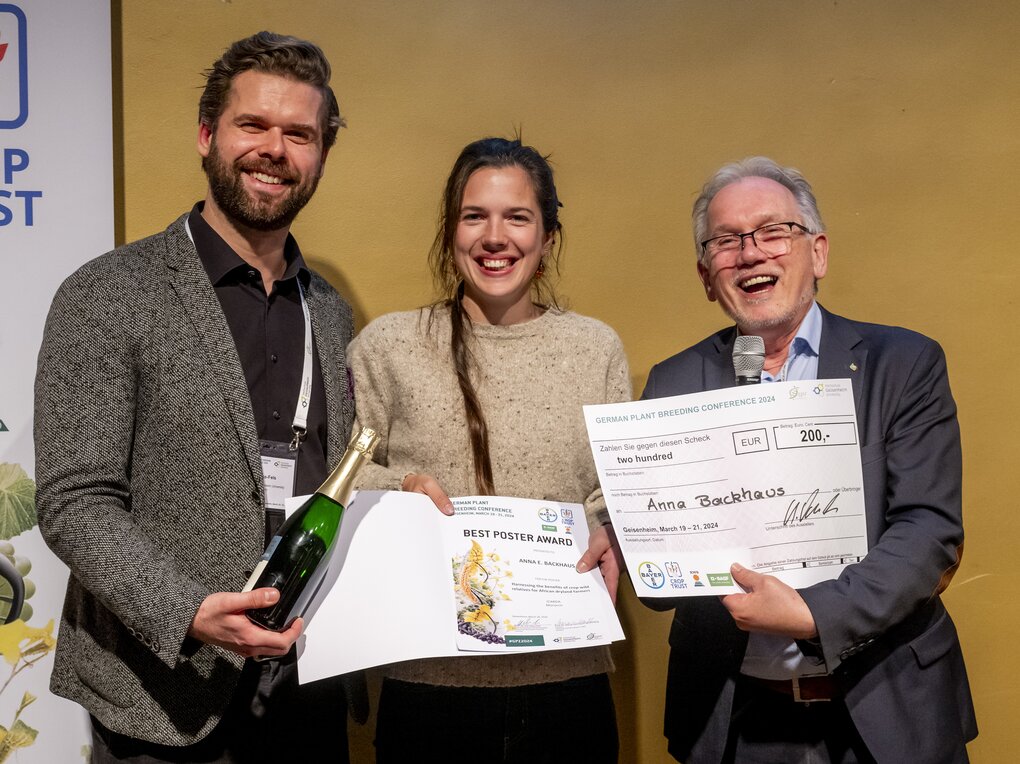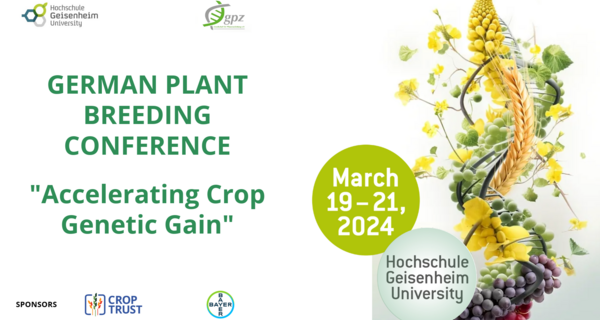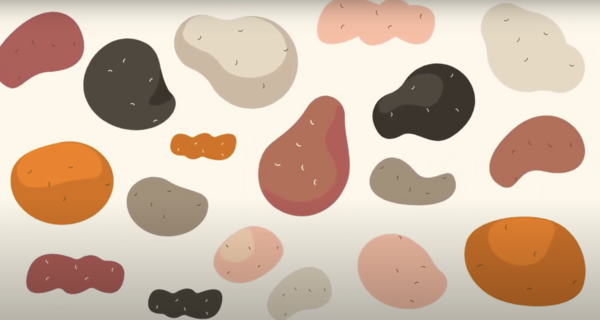Unlocking Hidden Gems: a BOLD Journey to Resilient and Diverse Crops

3 July 2024
What do alfalfa, barley, durum wheat, finger millet, grasspea, potato, and rice have in common? They’re all included in the Crop Trust’s BOLD project, which works to expand their genetic diversity.
Sounds a bit sci-fi, right? Experts are using a method called pre-breeding to unlock the latent potential of these crops, by introducing novel traits to make them more resilient. Collaborating with partners across 20 countries, including national and international research centers, BOLD is tapping into the massive genetic pool that is represented by the wild relatives of crops, generating new seeds with such vital traits as drought tolerance and disease resistance. So yes, there’s an element of Back to the Future in this. But it’s actually science fact.
"Pre-breeding brings in new traits or new genes that are not present in breeding programs and strengthen the resilience of the crops that we are working with in many parts of the globe," says Thiago Mendes, potato breeder from the International Potato Center (CIP) based in Nairobi, Kenya.
A Farmer-Centric Approach

BOLD grasspea demonstration farm cultivated by Mrs. Shushila Parmar in Bamuliya, District Sehore, India. Photo: Michael Major/Crop Trust.
Engaging farmers from the beginning, BOLD ensures that its efforts align with real-world needs, guiding the development of varieties tailored to local preferences. Although pre-breeding efforts usually do not produce varieties that are ready for the market, plant breeders include farmers as early as possible to ensure that the eventual commercial products will indeed be adopted later. By engaging in a participatory approach, BOLD ensures its efforts resonate with what the farmer –and the consumer – actually needs.
"In our BOLD project, we focus on rice due to its crucial role in our own and global food security. Despite its abundance in varieties, rice faces challenges such as susceptibility to pests, diseases, low nutritional value, and vulnerability to climate change. Through a participatory approach, we recognize farmers as the backbone of agriculture. Their insights shape our efforts, ensuring that new varieties align with their needs and preferences," says rice PhD student Loi Nguyen from the Vietnamese University Can Thao.
Unlocking the Potential of Crop Wild Relatives
Focusing on crop wild relatives can help solve issues in our modern cultivars, improving yields and disease resistance.
For instance, grasspea, a legume crop important for food and fodder in Asia, particularly India and Bangladesh, as well as Ethiopia, already has traits for surviving drought, water logging and salinity in the soil. Pre-breeding using its wild relatives enhances its safety for consumers, diminishing concerns over the presence of the toxin ODAP, which has hindered its wider adoption. Alfalfa, or lucerne, is naturally adapted to both hot and cold climate conditions. Still, plant breeders must now develop new breeding lines that not only withstand drought and heat but also produce higher yields. The finger millet, durum wheat and barley pre-breeding teams face similar challenges.
"BOLD is supporting us in developing new varieties for farmers and it helps us continue our efforts to mobilize beneficial crop genetic diversity. We can go to the genebank and look among these crop wild relatives, find the needle in the haystack that will give us the drought tolerance of the future, or disease resistance, or many other vital traits," - says Miguel Sanchez Garcia from the International Center for Agricultural Research in the Dry Areas ICARDA, who is leading the BOLD barley pre-breeding project.
Bioinformatics in Action
Deploying cutting-edge bioinformatics resources, BOLD streamlines data collection and dissemination, empowering breeders worldwide. Working with the James Hutton Institute, UK, BOLD helps partners to collect, upload, store, search, visualize and retrieve data on their (pre-)breeding products and the diversity they are generating. All the data collected is freely available. To collect, visualize, publish and share the data, the BOLD partners are using GridScore - a tool for phenotypic data collection and visualization and Germinate - an open-source plant genetic resources platform .
"The data is crucial for BOLD and everybody who works in these crops. They are often really underutilized and have limited resources, so being able to make them available to other scientists is important", stresses Paul Shaw from James Hutton Institute, BOLD bioinformatics project leader.
Showcasing Success Toward More Resilient Agriculture
Some of the partners involved in the BOLD pre-breeding and participatory evaluation work recently gathered in Germany for their annual meeting, and also participated in the German Plant Breeding Conference, an event showcasing the latest developments and innovations in plant breeding for sustainable agriculture.
In the conference session "Accelerating crop breeding for improved climate resilience and sustainability," BOLD researchers presented their achievements and lessons learned from BOLD's pre-breeding efforts with alfalfa, potato, barley and finger millet.

Anna Backhaus receiving the best poster award at the 2024 German Plant Breeding Conference. Photo credit: Torsten Silz.
"I'm excited about using all of these new technologies to access the hidden gems stored in the genebank that we couldn't access so easily or not at all until recently. We all know climate change is unfolding faster than we could have imagined. Trying to safeguard the nature we have before it's gone is a big challenge," - says Anna Backhaus, ICARDA’s pre-breeder from Morocco, who won a Best Poster Award at the conference.
Partners, including farmers, in 20 countries are crucial to make the Project’s pre-breeding successful in moving us towards a more resilient and sustainable agriculture.
“By facilitating the use of new diversity, we are contributing to The Vision for Adapted Crops and Soils (VACS) Initiative and making an impact on global food and nutrition security. By supporting plant breeders and farmers for climate change adaptation, BOLD is paving the way for a future where food security is not just a goal, but a reality” says Benjamin Kilian, BOLD Project Coordinator.
Category: BOLD



